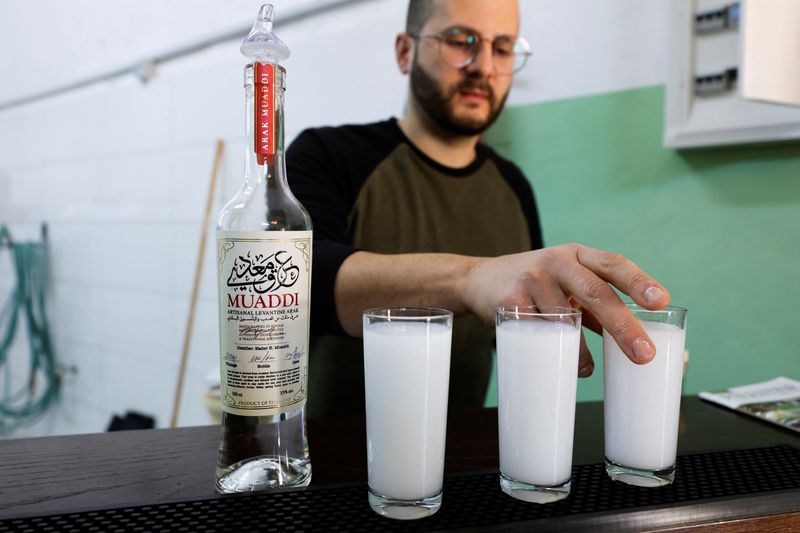Spirit of Christmas in village near Bethlehem
2022.12.18 10:07
[ad_1]
5/5
Spirit of Christmas in village near Bethlehem
Budrigannews.com – A clear liquid drips into a stainless steel barrel from a pot still in a small distillery outside of Bethlehem in the Israeli-occupied West Bank, ringing like church bells.
Nader Muaddi makes new batches of arak, an anise-flavored spirit, each year at Advent, which begins shortly after the grape harvest.
When mixed with water and ice, the drink turns a milky white color. It goes well with Levantine food, especially mezze and grilled meats.
Muaddi stated, “We do that during the holiday season because rak is used to bring people together around a meal, to share conversation, and to strengthen relationships.” Therefore, it’s not just Palestine’s spirit but also our Christmas spirit.”
The oldest distilled spirit is arak, which was first made in Iraq more than a thousand years ago. In the past, families all over the Levant made their own wine and arak, which they gave to visitors at Christmas.
A small percentage of Palestinians live in the West Bank, Gaza, and East Jerusalem as Christians. Many people live in and around Bethlehem, the traditional place where Jesus was born.
Muaddi asserted that the process of making arak was a means of reusing wine that had already been fermented into vinegar. He stated that while this custom has largely continued in neighboring nations like Lebanon and Syria, it came to an end for Palestinians when home distilling was made illegal under British and then Jordanian rule.
Muaddi claims that licensed arak factories eventually gave up entirely on the distillation process in an effort to cut costs and boost profits, compromising the quality of the product.
“People deserted it when the quality of arak went down,” he stated. It gained a bad reputation among Palestinians as “a drink for drunkards.”
But arak was at the center of every celebration for Muaddi, who grew up in the United States among Arab diaspora communities. He stated, “It’s the drink of companionship.”
When he moved back to the West Bank in 2007, he was spending so much money on high-quality arak from Syria and Lebanon that a friend said he should make his own, which he did in 2010.
He experimented, joined online forums, watched tutorials on YouTube, and read books until the recipe was perfect. At the point when companions and neighbors voiced interest in purchasing his arak, Muaddi, who works all day at a global helpful association, chose to transform his leisure activity into a side business.
The award-winning arak produced by Muaddi is made from grapes and anise native to the West Bank. In response to Israeli threats of displacement, movement restrictions, and Jewish settler violence, he stated that he hoped his collaboration with Palestinian farmers would encourage them to continue cultivating their land.
According to Muaddi, he purchases anywhere from five to fifteen tonnes of grapes annually, which can produce up to 3,000 bottles.
Muaddi picks high-sugar grapes that are crushed and undergo a natural wild yeast fermentation in late September and early October. They turn into wine after about a month, which is triple distilled in an Arabian pot still made of copper. In the third round, the anise seeds are added.
He sometimes sleeps on a styrofoam mattress at the Beit Jala distillery and sets an alarm for every 15 minutes to keep an eye on the process, which can take up to 26 hours at a time.
Muaddi stated, “Making arak the traditional way takes time, is tiring, and expensive.” As a little maker, “it’s difficult as far as we’re concerned to contend with imported products from Turkey or China and wherever else, in any event, with regards to liquor.”
But he said that the holidays are the best time for sales because people are willing to spend more.
Over 95% of enrolled Palestinian organizations are little or medium in size, said Adel Hodali, financier of the Bethlehem Office of Trade.
Breweries, wineries, and craft distilleries are springing up all over the West Bank. However, Hodali stated that arak producers are encouraged to export their goods because the Palestinian alcohol market is small and the majority of Palestinians are Muslim.
Regardless of the cost, Muaddi views reviving that local custom as a source of pride.
More Incident of Russian Soyuz spacecraft
“Not only are we losing land to the occupation in Palestine, but we are also losing aspects of our culture and culinary heritage as well. I want to revive arak’s popularity. I want to start an era of renaissance in Arak.”








